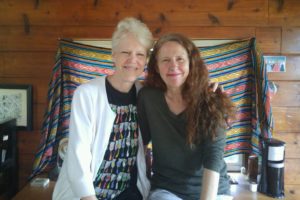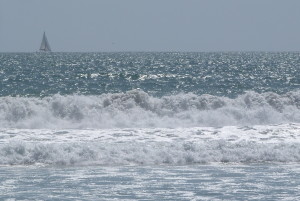Mari’s Blog

Anticipation and arrival
 Everyone knows, in this time of Christ, that the end of the old way is near and that the new is coming. They are thus moving toward anticipation rather than adaptation, and evolution moves with them. D:7.23
Everyone knows, in this time of Christ, that the end of the old way is near and that the new is coming. They are thus moving toward anticipation rather than adaptation, and evolution moves with them. D:7.23
It’s 5:41 a.m. with a storm brewing. Thunder woke me. Or I awoke wondering, Is that thunder? It is a low sound, distant and mistakable. I arrive in the cabin in anticipation of the storm.
I am sitting. I am looking out the window. The memories arise. They are memories of anticipation and arrival. First, of that moment when I no longer needed faith because I’d experienced that which I had faith in. The first starts a cavalcade of such remembrances. One is of riding my bike. I do not remember learning to ride a bike, but I do remember the anticipation and the experience of joy in the riding, and of the wind rushing past. My first airplane ride: the memory of getting ready to go, being late, the run down the departure gate in my sea-green dress and patent leather shoes, my mom running too, her purse slapping against her hip.
Memories arise in scenes.
Ah, those first days going off by myself, heading to Cherokee Park with keen excitement, maybe ten years old, meandering there with no task and no direction. What would it be like? No one supervising. Heaven . . . and moments of risk.
Oh, the memory of it all. Standing in my wedding gown begging my sister-in-law to let me go pee one more time before walking down the aisle.
We say, “The anticipation is killing me.” It . . . anticipation, surely does . . . something. It is like that moment before what we’ve imagined comes true. The anticipation of the experience, and then the experience. That moment or hour or day of arrival. The creative flow of a book being written and then, ah, the moment of its going out. It has been birthed. It has its own life. The irrevocable, no turning back moments. Something has begun. And before that, something began even before it was begun.
Out my window it is still lovely and dark. The storm did not come. The parade of memories has passed by and I put my fingers to the keys, knowing I am anticipating the New, and that I notice it as it arrives.
This past week I was visited by Janet, a friend from New Jersey. We shared a dialogue and recorded it for the Dialogue Series. It was anticipated and it arrived. It was experienced and it lives now in a reality not only caught on video, but in her heart and mine. (Our dialogue will become part of the on-going Dialogue Series in coming weeks.
(centerforacourseoflove.org/dialogue)
In memory—people, as well as experiences—live with you, take up residence within you, become part of you. They “cross your mind,” yet live in your heart, the memory’s retrieval happening quite apart from conscious volition. Arising.
Every living being has a heart. Let us define heart as the center of being, that place from which all feeling arises. C:1.1
This “arising” is the beauty that Jesus draws us toward in A Course of Love. I’m convinced that the New “arises” in this way. It is the reason for all the reminders not to try, apply effort, or seek to achieve anything. We do not know that which we are heading toward until it comes. It is forever coming on, never abating, as constant as the rising and setting of the sun, but with textures as mysterious as the waxing and waning of the moon. All of life prepares us for the coming of the New!
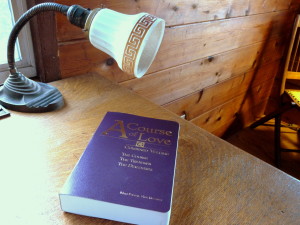 You and I really can exist in delicious anticipation for the arrival of the New, appreciating the heightened state that anticipation brings, the tingling and the wonder and the slow and steady revelation. And . . . each of us can announce the arrival of the New.
You and I really can exist in delicious anticipation for the arrival of the New, appreciating the heightened state that anticipation brings, the tingling and the wonder and the slow and steady revelation. And . . . each of us can announce the arrival of the New.
In the passages below, Jesus speaks of those who awaited his arrival, and his own witness to ours:
Let me speak briefly of the role I played so that you can better understand the role that waits for you. I came in the fulfillment of scripture. All this really means is that a certain community had been led to expect my arrival. They awaited me with expectation and so found in me what they hoped to find. What my brothers and sisters saw in me allowed me to be who I was, even while in human form. I tell you truly if you were to see any of your brothers and sisters today as those who awaited my birth saw me, they too would remember who they are. This is the role I ask you to accept so that you can provide for others what was provided for me. C:19.8
My testimony witnessed to your arrival just as the scriptures witnessed to mine. Even while some of my words were distorted or misinterpreted, you can still revisit them and see that this is so. I did not proclaim myself to be above or different from the rest, but called each of you brother and sister and reminded you of our Father’s love and of our union with Him. C:19.11
I’m following the example of one of our ACOL Facebook group members and capitalizing the New for emphasis. And by speaking of the ordinary to get to the extraordinary, I am following my gut away from the lofty and toward all that is available to us, right within our ordinary lives, to lead us to the extraordinary Newness we’re called to:
To sustain Christ-consciousness in form is creation of the new. My one example life could not sustain Christ-consciousness for those who came after me but could only be an example. What you are called to do is to, through your multitude, sustain Christ-consciousness, and thus create the union of the human and the divine as a new state of being. T4:4.18

Go out in peace
 You who have found peace—live in peace. You who have been
You who have found peace—live in peace. You who have been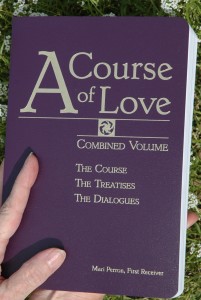 given the Peace of God—go in Peace. Spread peace throughout the land. Go out in peace and love and service to all. For in this going out you come home and bring with you all the brothers and sisters you have brought to peace. Go in peace to love and serve with all your heart. Thus are we one heart, one mind, one unity. Thus are we one in a relationship of love and peace that is our eternal home. Welcome home my brothers and sisters in Christ. Welcome home. T1:10.15
given the Peace of God—go in Peace. Spread peace throughout the land. Go out in peace and love and service to all. For in this going out you come home and bring with you all the brothers and sisters you have brought to peace. Go in peace to love and serve with all your heart. Thus are we one heart, one mind, one unity. Thus are we one in a relationship of love and peace that is our eternal home. Welcome home my brothers and sisters in Christ. Welcome home. T1:10.15
Those of you who’ve been following my blog for a while know me pretty well. At least I feel that you do. I just kind of carry on, writing on Sunday mornings about whatever is there. As I wander down one path and another in what I share, I figure you’ve heard it all about now. But then I go and start doing something new! And when I enter change, each time I enter change, you’d think I’d never experienced change before!
This spring was the start of something new. I knew it. I could feel it. I was ready to accept it. I am ready to accept it. Nothing big is happening next month or the month after, but then it starts. An event here, a talk there. My friend Kathy Scott Perry has agreed to partner with me to help coordinate this newness, and I can’t tell you how much that means to me. She’s been an event promoter for decades, knows everyone, has vision, and she “gets me.” We’ll just carry on as friends as we find our way toward answering requests for gatherings, feeling our way to doing them newly—and keeping me sane at the same time!
I’ve been like a kid exploding off the school bus at the end of the year, ready to hang up my uniform and burst out the back door, letting the screen slam as I head into the sun with all my ideas of what the summer is going to bring. But there’s such a thing as too many ideas. I mean, I wouldn’t be me if I didn’t see both sides of the thing, would I? The human complexity that gets thrown in the mix with the inspiration?
 I experienced it this morning. I had so many ideas roaming around that I couldn’t get a one to light so that I could start this blog. Well . . . I started one and then I got distracted. I started another and got distracted again. I suppose it could be something like having a bunch of ideas for a new book, and ‘cause you’ve got a bunch of ideas you might not ever write, or if you write, you might create nothing more than a big, huge, mess. Actually, for starting a book a mess is fine. No matter how messy the draft, it’ll start the process. The mess doesn’t get enough time to work its way out with a blog, but it does work that way with most everything. Starting—is what gets you going every time. Once you start, you enter the new. I have started . . . something new, and I have found a way not to get wigged out by it.
I experienced it this morning. I had so many ideas roaming around that I couldn’t get a one to light so that I could start this blog. Well . . . I started one and then I got distracted. I started another and got distracted again. I suppose it could be something like having a bunch of ideas for a new book, and ‘cause you’ve got a bunch of ideas you might not ever write, or if you write, you might create nothing more than a big, huge, mess. Actually, for starting a book a mess is fine. No matter how messy the draft, it’ll start the process. The mess doesn’t get enough time to work its way out with a blog, but it does work that way with most everything. Starting—is what gets you going every time. Once you start, you enter the new. I have started . . . something new, and I have found a way not to get wigged out by it.
In addition to partnering with Kathy, I’m just telling everything to “go in peace.”
My dad used to say that. He had all kinds of versions of peace—except maybe the hippie one. We’d say prayers over dinner each night—the standard, “Bless us O Lord and these our gifts,” and then he’d follow it with, “Eternal rest grant onto them oh Lord,” and we’d say, “And let perpetual light shine upon them.” Then he’d say, “May they rest in Peace,” and we’d all say, “Amen. Then he’d say, “May their souls and all the souls of the faithful departed, through the mercy of God, rest in peace.” And we’d all say “Amen” once again. (For a long time we had sit-down meals like clockwork. Monday through Friday, Dad got home from work and we’d sit down to eat at 5:30. Just about every other house on our block was the same. My daughter Mia recently told me that sitting down to dinner with family makes her feel safe. We did the family dinner thing too, and God bless the safety of it as it lingers on.)
But my dad, he’d also say, “Peace be with you,” as he finished things up or headed out the door. He didn’t say “my girl” too much, but it seemed he always said, “My boy.” “Peace be with you my boy,” he’d say to my son, or sometimes, “Peace be with you my lad.” You remember things like that when you start sending your ideas out into the world with a hardy, “Peace be with you.”
The little quote above on peace came back to me—gave itself to me like a gift. A Course of Love brings me just the right thing at the right time . . . time after time . . . and it still amazes me. And I love it when it combines with memory, sometimes actual, physical memories like this one of my dad, and at other times memories of someone I know I am, but have forgotten, and then momentarily remember.
“Go out in peace and love and service to all.” I’m applying this not only to my “own” going out, but to my ideas too. Telling them, “Go out in peace.” I swear it’s like they have a life of their own. So why not let them go. Having them hanging around was getting me feeling a little crowded.
Here’s another gem that helped:
You who have so recently felt the peace of true acceptance are not asked to leave that peace to go in search of calling but are rather asked to listen from within that peace to what you feel called to do. This is not about the past and all those things that at one time or another you thought would bring you fulfillment. This is about recognizing who you are now. This is not a quick fix that calls you to what might have been and tells you that if you had but acted earlier you would have had the life you’ve dreamed of and maybe it is not too late. This is not about examining where the various calls you responded to previously have led you. All these notions are concerned with who you have thought yourself to be, not with who you are. They do not recognize the difference between thinking and knowing. Being who you are is what you are called to do. You are here asked to live a life as seamless as that of the birds of the air. You are asked to live a life where there is no division between who you are and what you do. This place of no division is the place of unity. T2:4.12-13
And so I say to you, Peace be with you. And I invite you too, if you’ve got the feeling, to simply start. Start to “Go out in peace and love and service to all.”

Evening and the change from either/or thinking
 Relationship and union are the way of God. The way of heart and mind, body and soul, heaven and earth. God is being in unity and relationship. So are you. D:Day37.6 (emphasis added)
Relationship and union are the way of God. The way of heart and mind, body and soul, heaven and earth. God is being in unity and relationship. So are you. D:Day37.6 (emphasis added)
After weeks of walking in the evening rather than in the morning, I ask myself, What’s with me? Why this change? How profound of a change is it? I come in and smell like the outside, just like the kids did when they were little. Do I ever remember coming in this way myself, with the fresh air clinging to me? With images of the simple lawns and homes of the neighborhood imprinted on me: of cottontails eating clover, red wheel barrow leaning against garage, pink plastic watering can on its side in garden, lime green beach ball nearly hidden between bushes, grey cat in window, shade pulled halfway over small round table, lamp lit in twilight.
All of it beaconing to me, to a deep welling over of memory and thought, particularly of times when I didn’t question as gently as I do now, in which I felt downright fraudulent for not feeling “all one way.” What is this questioning, I wonder, if not of the sense, implanted for so long, that there is an either/or nature to life?
Paradox has been with me lately, and even still, here I am, questioning myself as I change: What’s with me?
Then I realize the whole idea has been brought up because I need to write about this. A gentle musing kind of writing…because there was a time, not so long ago, that I could barely accept the both/and in myself.
As Parker Palmer says, we “Fail to embrace the paradoxical nature of the human self.” And as Jesus says, we were taught not to. Jesus goes right to the separation of head and heart, but in my memory I think of “Be a big girl now.” That’s my first memory of it, as if a day came that drew a line between being a little girl and being a big girl. How, when we’re “little,” do we understand what being a “big” boy or girl means?
It’s no wonder you and I can spend a lifetime coming back from all those lines that were drawn. It’s no wonder it takes a while to accept the both/and message of A Course of Love.
Jesus does a lot of talking about both/and before he uses those words. He speaks of the way of the world as one that separated not only heart and mind, but thoughts and feelings, men and women, and of course the ever present good and bad. I wouldn’t be surprised if our current election in the U.S. isn’t one of the biggest demonstrations ever of this penchant, which is not only a penchant to separate but an acknowledgment that separation uses judgment, sometimes by way of facts, sometimes by way of bias, sometimes by way of meanness, and sometimes simply by ignorance or ego. This separation makes us distant from ourselves and others, ourselves and the life we’re living. It causes a separation between theory and practice, and solitude and community too. Endless divisions, including the division between humanity and divinity.
But what I’m looking at is the simple things in life right now. For instance, I might have said about recent travels: “I loved it, but I was anxious about public speaking.” What a different statement to say, “I loved it, and I was anxious about public speaking.” Or how about this more general one: I accept change but it confuses me . . . adjusted to . . . I accept change and its confusion? Everything becomes more gentle with that simple admission of “and.” “I love you and I’m angry.” How different than “I love you, but I’m angry!”
In A Treatise on the Personal Self, we hear:
“You cannot have an idea of goodness without having an idea of evil. You cannot have an idea of an ideal state without having an idea of a state that is not ideal. You cannot have an idea you call “right” without believing in an idea that can be “wrong.” The ego made such ideas necessary for the idea of the ego was “wrong” or inaccurate. The only way to bring that inaccuracy to light was through contrast. To function from an inaccurate foundation was to build upon that foundation. Building a structure with a foundation that would not support it was the folly that the ego made of life. The only way for such an error to be seen as an error was through its dysfunction. The only way to correct such an error is to dismantle the structure and begin again with a foundation capable of being built upon. This is what we have done. We have taken away the foundation of illusion, the one error that became the basis of all that came after it. You cannot make another error such as this for it is the one error. Does it not make sense that the only error possible is that of not being who you are? (4.3-4.6)
I love it that this ends with “the only error possible is that of not being who you are.” I’ve seen that I can’t accept who I am without accepting paradox. One meaning of paradox I like is this: a statement that seems contradictory, unbelievable, or absurd but that may be true.
In ACOL, many statements that tell us that we are both human and divine would fit this definition. These passages are from The Dialogues, Days 10 and 36:
I have spoken with you throughout this time as the man Jesus so that you realize that man and Christ-consciousness can be joined. That you, as man or woman, existing in this particular time and space, can join with Christ-consciousness. You can be both/and, rather than either/or. 10.21
Yet you do not disappear or cease to be. You are not replaced by God whom you have always been one with in being. You simply accept the truth of being and the truth of being in union and relationship. Both at the same time. Both/and rather than either/or. Cause and Effect. Means and End. You accept the end of choice and the beginning of creation. 36.18
The result of a world in which paradox is accepted may range more toward the bewildering and unknown than the tried and true, but it gives life back to us, and us back to life. I know it’s essential for this time of creation of the new. And it’s so exciting! Almost everything I look at these days is being greeted with, “In what way can I do this newly?” What a gift that is!
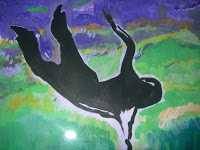
I don’t know that a time of being undone by the perplexities of paradox doesn’t await each of us. It sure did me. For many years after A Course of Love came to me, I struggled with the dichotomies of my life in those big, “undoing” ways. During one such time I painted this picture and called it Falling through Twilight. Things were so mixed up in me that I needed to do something different to get at what I was feeling, and what I did, for a short while, was paint. And I used to say, “I’m a writer, but I paint occasionally, and not well!”

Ideas and Clues . . . to the New
 Be jubilant rather than hesitant about the time of discovery that is before you. Calling what you think you know into question is not a call to return to uncertainty, but a call to allow real certainty to come. D:6.16
Be jubilant rather than hesitant about the time of discovery that is before you. Calling what you think you know into question is not a call to return to uncertainty, but a call to allow real certainty to come. D:6.16
How do I release myself from the thoughts that are taking me away? Well, they’re not really thoughts. They’re ideas. A brazillion tumbling ideas. Are they taking me away “like a stream carries water?” Or are they taking me away by distracting me from what’s in front of me?
Driving through Marin on my trip up the coast of California, I thought of Anne Lamott. She told me years ago to look out the window. “Look out the window. Keep writing.” Am I meant to watch the squirrel’s see-through tail glowing in the morning sun—with, or without—the damn ideas? I return my view to the table and to Creation of the New. I read it because ideas and thinking feel too closely linked right now, and I can’t think when reading it.
“There is this and there is that. The babe. The world.” (Creation of the New)
Last night I had a dream, or a waking little set of ideas, or maybe what accounted for a dialogue with Christ-consciousness. Where does the division lie?
You don’t need me. Your answers lie within. You need to share to get them out
Lord, I say, I am not still.
I need quiet. And I am not still. I am not being allowed my stillness. Ideas well up. Spill over. Which way to go.
I hear . . . or remember . . . Ideas are birthed. Ideas leave not their source.
Parker Palmer, in Letting Your Life Speak, said, “Clues, by definition, are coded and must be deciphered.” Remembering this, and not what comes next, I go back to the book to see. What comes next for him? In his narrative, he returns to his early life, the professions he saw himself in, professions he knows he would have been miserable in, yet in which he sees “clues” to his future anyway. Hmmm.
Looking up the word decipher I can hardly believe it’s definition:
Decipher: To translate (a message in cipher or code) into ordinary, understandable language. To make out the meaning of.
Whoa and wow! Isn’t that what we’re all doing with A Course of Love? Translating the messages we’re receiving from it into the meaning they have for our own lives and for new living?
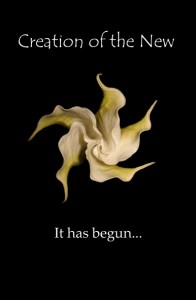 Reading Creation is like going into the parts of ACOL that hold the greatest mystery. There are other books that have done for me what Creation is doing at the moment. I spent probably half a year with DH Lawrence for that reason not long ago. These are works that break me out of my own “mind-set,” out of the usual tracks in which my thoughts and ideas flow. This is, at least, what I suspect they do for me. I can’t say for certain. But I feel that what this has given me is a clue to the clues. They are messages in code. Messages that come in new patterns.
Reading Creation is like going into the parts of ACOL that hold the greatest mystery. There are other books that have done for me what Creation is doing at the moment. I spent probably half a year with DH Lawrence for that reason not long ago. These are works that break me out of my own “mind-set,” out of the usual tracks in which my thoughts and ideas flow. This is, at least, what I suspect they do for me. I can’t say for certain. But I feel that what this has given me is a clue to the clues. They are messages in code. Messages that come in new patterns.
Just after writing this I open A Course of Love. I read, “You need not return to old patterns.” I feel suddenly and fully comforted in the reading I so appreciate, the reading that takes me away from my mind’s old patterns. This renews my confidence that something in me knows what I’m doing. As I release the old thought patterns, I can better welcome the new. From The Dialogues, Chapter 4:
What is one, or in union with all, draws from the well of divine design. You need not turn to old 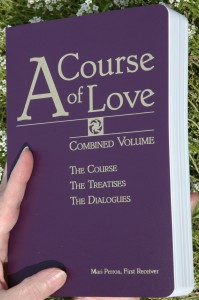 patterns or systems to accomplish your release. You can only turn to what is, to what is left now that the patterns and systems of learning are no longer. You accept that what has been given is available. You accept and you receive. You realize that the first order of creation of the new is restoration of the original order, or original design. As you have been returned to your Self, now your life must be returned to where it fits within the divine design, to where it is a life of meaning and purpose. This return is the return of wholeness. This return is not selfish on your part, but magnanimous. It returns wholeness to you and wholeness to the divine design. It returns creation to what it is. D:4.28-29
patterns or systems to accomplish your release. You can only turn to what is, to what is left now that the patterns and systems of learning are no longer. You accept that what has been given is available. You accept and you receive. You realize that the first order of creation of the new is restoration of the original order, or original design. As you have been returned to your Self, now your life must be returned to where it fits within the divine design, to where it is a life of meaning and purpose. This return is the return of wholeness. This return is not selfish on your part, but magnanimous. It returns wholeness to you and wholeness to the divine design. It returns creation to what it is. D:4.28-29
In whatever way I find release of the old, I welcome the new. I don’t have to throw the new ideas out, just the patterns of thought that sometimes cling to them. Release comes for me in the mystery of mystical writing, or the rhythm of another’s voice. It is what poetry and art and music do. It’s like they turn off the 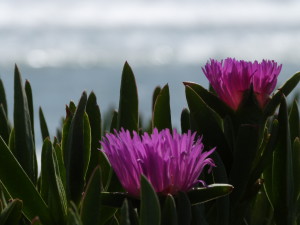 old pattern but leave the new idea. Whichever way of release is ours, it can return us to being the new babe. The babe newly birthed into union.
old pattern but leave the new idea. Whichever way of release is ours, it can return us to being the new babe. The babe newly birthed into union.
All ideas here are but ideas of union come to replace ideas of separation. C:11.4
To “Bewilder and dazzle and summon.”
 While I was traveling and not listening to radio or television, a Minnesota native and cultural icon, Prince, died. I learned of his death in the church at which I spoke in Sacramento, where right during the service, they did a tribute to him. Since then, Daniel Berrigan, a major figure in anti-war and social justice movements, died. In a notice of his death written by Rabbi Michael Lerner (Tikkun magazine), I found these words from a writer I’m fond of, biblical scholar, Walter Bruggemann. They concerned his review of Berrigan’s Genesis (2006). “He imitates his creator with his generative word that calls forth linkages and incongruities and opens spaces that bewilder and dazzle and summon the reader.”
While I was traveling and not listening to radio or television, a Minnesota native and cultural icon, Prince, died. I learned of his death in the church at which I spoke in Sacramento, where right during the service, they did a tribute to him. Since then, Daniel Berrigan, a major figure in anti-war and social justice movements, died. In a notice of his death written by Rabbi Michael Lerner (Tikkun magazine), I found these words from a writer I’m fond of, biblical scholar, Walter Bruggemann. They concerned his review of Berrigan’s Genesis (2006). “He imitates his creator with his generative word that calls forth linkages and incongruities and opens spaces that bewilder and dazzle and summon the reader.”
To “Bewilder and dazzle and summon.”
What a sentence! I share it because it reminds me of those places within A Course of Love—places that open spaces that bewilder, dazzle, and summon. Is it any wonder that the favorite chapter of many of us is the chapter on The Embrace with its poetic language:
Your beauty is the gathering of the atoms, the order in chaos, the silence in solitude, the grace of the cosmos. Our heart is the light of the world. 20.5 We are one heart. 20.6 We are one mind. One creative force gathering the atoms, establishing the order, blessing the silence, gracing the cosmos, manifesting the light of the heart. Here we live as one body, experiencing communion, the soul’s delight, rather than otherness. It is a seamless world, a tapestry where each thread is vibrant and strong. A canticle where each tone is pure and indivisible. 20.4
I find as many of these places in my mystical writing in Creation of the New.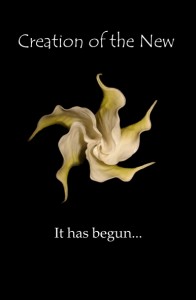
“The new is intimate before it is known. Familiar before it can be named. Glimpsed before it is seen. Bedecked with the sublime before it shows itself.” ( CON 20)
I’ve noticed that when I cannot “wrap my head around it,” I have found what I’m looking for.
How strange it is to write yourself, those things that bewilder you. Yet I do it all the time! Poets do it all the time! Most of the writing of my life has come from bewilderment. Once, about seven years ago, I met with an old friend who asked me, “If you could choose one word for how you feel about A Course of Love, what would be?” I said “Befuddled.” His eyes got wide and he said, “Befuddled” was the same word he was going to say.
It occurs to me that I am less befuddled now, but that I may not be being called to let go of such feelings, but to embrace them. Even when I feel like this:
My life is changing and I’ve got decisions to make. Ways I cannot fully envision and that I need to have come to the surface. And I want to avoid it all too. I am full of “want to” and “don’t want to.” My upcoming hour to visit with a friend? “Want to”/”don’t want to.” Double and triple it for things like going to the post office and the bank. For finishing my thank you notes. I want the feeling of being DONE with things lingering more than anything else, and I don’t want to do them.
How freaking human is that!
I write myself notes. Last night’s note included, “Walk.” I want to walk and I don’t want to walk. I’ll add that it’s 40 degrees and windy, but I’m not sure it would be different if it was 20 degrees warmer and still. Isn’t that incredible! And incredibly human! I also feel a desire to be wanted and a desire to be left alone. Everything is like this. I write a note to Jesus: “Maybe we could talk about it sometime, Lord.”
He doesn’t respond. But maybe Bruggeman did. His comment on “Genesis” reminded me of the link between creation and confusion, as well as of how, as Jesus says, we can hear the Christ voice everywhere.
Of course, in terms of my humanity, I realize that I’m simply in change. Knowing ourselves in “the new” isn’t the “old” knowing. The new knowing is not being comfortable because we have a fixed position. It’s walking on shifting sands. Letting go of hand holds on the shore of the stream.
I find comfort within ACOL in words like these:
This course was written for the mind—but only to move the mind to appeal to the heart. To move it to listen. To move it to accept confusion. To move it to cease its resistance to mystery, its quest for answers, and to shift its focus to the truth and away from what can be learned only by the mind. I.1
This Course has succeeded in ways you do not yet understand and have no need to understand. C:32.4
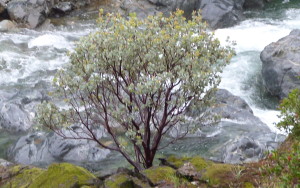 This is the thing. We move through unknowing into what is often an uncomfortable knowing—uncomfortable because it can’t be grasped. It doesn’t make sense to the mind, and the way in which it makes sense to the heart can’t be explained. Slowly, we move into “let it be” mode. We sit within the confusion, the paradox, the bedazzling, and . . . let the stream carry us.
This is the thing. We move through unknowing into what is often an uncomfortable knowing—uncomfortable because it can’t be grasped. It doesn’t make sense to the mind, and the way in which it makes sense to the heart can’t be explained. Slowly, we move into “let it be” mode. We sit within the confusion, the paradox, the bedazzling, and . . . let the stream carry us.
“Suddenly she realizes she is in the stream and is the stream.” (CON 112)

